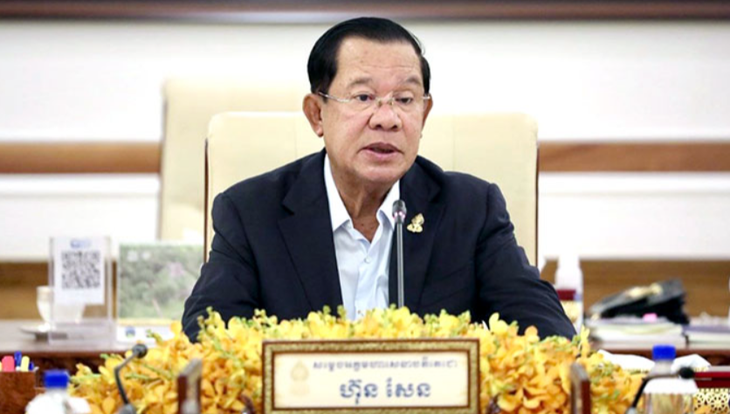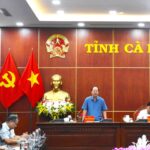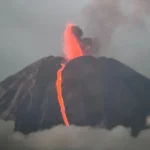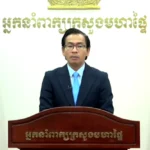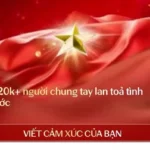Cambodian Senate President Hun Sen has recently strongly criticized the burning of Thai goods organized by a group of individuals, calling it an extremist act that does not reflect genuine patriotism.
On October 21, Cambodian Senate President Hun Sen criticized the actions of a prominent real estate figure – KO1 – who organized a campaign to boycott and burn goods originating from Thailand.
KO1 (real name Khoeun Sola) and his group conducted protests at numerous gas stations across Cambodia, collecting Thai goods and publicly burning them.
Related images and videos subsequently spread widely on social media, attracting significant public attention.
On his personal account, Senate President Hun Sen expressed deep disappointment, stating that this action not only damages the national image but is also counterproductive in the context of Cambodia’s efforts to develop its economy and expand regional cooperation.
“Burning Thai goods and attacking those who continue to trade Thai goods is not a patriotic act, but extremism” – Hun Sen emphasized.
Hun Sen recommended that Thai goods already imported should be sold out, rather than continuing to bring more into the market, while calling on people to prioritize consuming domestically produced goods as a practical way to boost the national economy.
Yang Peou, Secretary General of the Royal Academy of Cambodia, assessed that boycotting Thai goods might stem from patriotism, but if not accompanied by management solutions and support for domestic production, the action remains temporary and potentially counterproductive.
He also questioned the origin of Thai goods in the market while the land border between the two countries remains closed. “If the border is closed, goods must be coming through sea routes or informal channels” – he said.
According to Peou, the core issue isn’t about burning goods, but about preventing illegal imports, enhancing domestic production capacity, and building sustainable supply chains.
Peou emphasized: “This is the time for people to prioritize using domestic goods. This is not only an opportunity to promote domestic production but also a test of trust and unity in economic development.”
He also warned that smuggled goods not only cause state revenue loss but also weaken confidence in domestic products, hindering efforts to build national brands.
Yang Peou called on relevant authorities to urgently investigate informal import routes and strictly handle violators to practically protect national interests.
Regarding related matters, Yang Peou believed that sustainable solutions can only be achieved through close coordination, unity, and mutual trust between the government and the people.
Amid widespread online rumors about Cambodia ceding territory to Thailand, Prime Minister Hun Manet has refuted these claims, affirming that there are no land concessions in the peace agreements between the two countries.
Cambodian Senate
The Cambodian Senate is the upper house of the Parliament of Cambodia, established in its current form by the 1999 constitutional amendment. It serves as a legislative review body and represents the interests of local authorities. Historically, it replaced the Constitutional Council, which had existed briefly after the 1993 elections.
Royal Academy of Cambodia
The Royal Academy of Cambodia is the country’s national academy and leading research institution, founded in 1965. It is dedicated to the preservation and promotion of Cambodian culture, language, and social sciences. Its work includes research in fields such as history, linguistics, and philosophy to support national development.
Thailand
Thailand is a Southeast Asian country with a rich cultural heritage shaped by centuries of independent kingdoms, most notably the Sukhothai and Ayutthaya empires. It is unique in the region for never having been colonized by a European power. The nation is renowned for its ornate Buddhist temples, vibrant festivals, and distinctive cuisine.
Cambodia
Cambodia is a Southeast Asian nation most famous for the magnificent temple complex of Angkor Wat, the heart of the powerful Khmer Empire from the 9th to the 15th centuries. The country’s more recent history was tragically marked by the brutal Khmer Rouge regime in the 1970s. Today, Cambodia is known for its resilient culture, deeply influenced by Theravada Buddhism and its awe-inspiring ancient monuments.
Thai goods
“Thai goods” refers to the wide variety of traditional and contemporary products originating from Thailand. Historically, these goods, such as silk, ceramics, and handicrafts, have been deeply influenced by the country’s rich artistic heritage and royal patronage. Today, they represent a blend of ancient craftsmanship and modern design, popular in global markets for their quality, intricate details, and cultural significance.
domestic goods
“Domestic goods” is not a specific place or cultural site, but a general term for products used in a home, such as cookware, furniture, and textiles. Historically, the production and trade of these items have been central to local economies and craft traditions worldwide. The evolution of domestic goods, from handcrafted items to mass-produced commodities, reflects broader social and industrial changes in society.
national brands
“National brands” refers to a business concept rather than a specific place or cultural site. It describes products or companies that have achieved widespread recognition and consumer trust within a particular country, often becoming symbols of national identity or economic pride. These brands can have long histories, sometimes evolving from small local businesses into household names that reflect a nation’s industrial and commercial heritage.
peace agreements
Peace agreements are formal political accords between warring parties to end a conflict and establish a lasting peace. Historically, they have been used for centuries, from ancient treaties to modern comprehensive documents like the 1995 Dayton Agreement that ended the Bosnian War. These agreements often involve complex negotiations over issues such as territorial disputes, power-sharing, and human rights.

